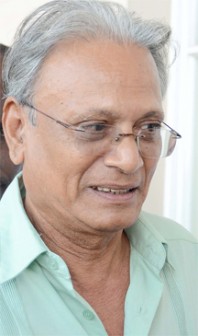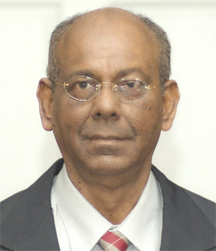APNU front bencher Dr. Rupert Roopnaraine is defending the move by the opposition for a majority on the Parliamentary Management Committee (PMC), while dismissing criticism that it would harm cooperation with government.
Roopnaraine does not see eye to eye with his former colleague on the Constitutional Reform Commission (CRC), previous House Speaker Ralph Ramkarran, who called the attempt by APNU and the AFC to change the composition of the PMC “a backwards step” and urged that they reconsider it. Roopnaraine also believes that from the beginning, the Public Accounts Committee (PAC) and the Sectoral Committees on economics, natural resources, foreign affairs and social services should have been weighed in favour of the opposition, because of the oversight nature of their functions.

A motion in Roopnaraine’s name is one of three by opposition members that will be considered today in the National Assembly. His motion is intended to amend the Standing Orders to change the composition of the PMC to reflect an opposition majority.
Writing in last week’s Weekend Mirror, Ramkarran said that the establishment of the PMC marked an important development of democratic and peaceful political process in Guyana, and was intended to build consensus among the parties.
The PMC had arisen from the St Lucia Statement of 1998 and was aimed at healing the divisions of the PPP/C and the then PNC and enabling the latter to return to Parliament.
But Roopnaraine said the St. Lucia Statement and the CRC, which Ramkarran cited in his article, essentially belong to the same historical juncture. “It would have followed all of the unrest after the 1997 elections, signing of the Herdmanston Accord and the fact that St. Lucia became necessary in July because the [envisioned] effects of the signing of the Accord did not bear fruit,” he told Stabroek News on Wednesday.
Roopnaraine noted Ramkarran’s tenure as the Chairman of the PMC and the CRC, of which he was also a member. “…He [Ramkarran] knows as well as I do that the search for consensus in that period was less a search for consensus than it was a search for containing conflict and managing conflict,” he said. “I never believed that the PMC on its own had the capacity to generate consensus. It was there to manage conflict. To what extent it succeeded in managing conflict is for people to decide,” he added.

In response to Ramkarran’s concerns about the opposition’s move harming cooperation and consensus building, Roopnaraine accused the government of not fostering an enabling environment through its actions. “It does not help the building of consensus for the government to be abusing the opposition in Parliament – to talk about it as a parliamentary dictatorship and an opposition ‘dictatorship of one,’ and all of the abuse that has been taking place in the media,” he said.
He added that by its perpetual abuse of the opposition, the government is showing no interest in building the kind of environment that would guarantee cooperation “that they claim they want.” “The PMC on its own, whether it’s nine members or ten members, as a single institution, cannot guarantee consensus and, frankly, in the present moment, it would give a completely false impression of cooperation and parliamentary collaboration, which at this present time does not exist,” he said.
Speaker Raphael Trotman, in a comment to Stabroek News on Wednesday, said that because of the nature of the PMC and the circumstances leading to its coming into being, it had not been slated for change in its composition.
Trotman explained that at a Committee of Selection meeting on March 7, there was an agreement that the PMC would not be among those committees that would be changed to reflect the opposition majority.
As a result, he added that he was surprised to see the motion from Roopnaraine to reconfigure the PMC from five members from each side of the House to five for the opposition and four for government.
Meanwhile, Roopnaraine also said the four Sectoral Committees should have always consisted of an opposition majority, since they were intended to scrutinise the government. “They were scrutiny committees and were supposed to perform the functions of audit,” he said. “The government cannot be asked to scrutinise itself.”
Similarly, he added, the PAC, which is chaired by the opposition, should have had from the beginning an opposition majority, notwithstanding the government’s majority in Parliament.
When the motion in Roopnaraine’s name comes up today, it will not be debated; rather, it will be sent directly to the Standing Orders Committee, which will make a decision and report back to the National Assembly. “There is time between now and then for the government to demonstrate a sincere attitude towards building consensus in the National Assembly.
“Frankly, were they to demonstrate that, then discussions in the Standing Orders Committee would be more open,” Roopnaraine said.
In his Weekend Mirror column, Ramkarran said the obvious objective of the PMC was “to encourage consensus building and to ensure that one side did not dominate the other.”
“This would mean that the opposition intends to impose their majority on the PMC contrary to the objective of the St Lucia Statement which agreed to the establishment of the PMC for the better organisation and functioning of the Parliament,” he wrote, while noting that with a majority opposition in the National Assembly, there still can be a role for the PMC.
He also said that the PMC can continue to play its role in providing a forum for resolution of differences before they reach the floor of the National Assembly. “But it can only do so if it retains its most important feature – equality of representation,” Ramkarran added, saying that the “impending destruction” of the PMC would send the message to the government that the opposition is not interested in the continuation of cooperation. “…[It] will not help the opposition in its parliamentary work… the opposition should reconsider the wisdom of pursuing changes to the structure of the PMC,” he urged.




